
My Favorite Teachers from Children’s Books
This content contains affiliate links. When you buy through these links, we may earn an affiliate commission.
We all know that a truly spectacular teacher can change the trajectory of a child’s life.
Back when I was in high school, a young teacher entered our school grounds. She looked like she could have been a student herself, except that when she was in the classroom she took a “take no prisoners” approach to teaching. She outlined her lectures on the whiteboard and spoke rapidly while we scrambled to take notes. She called on us regardless of whether we raised our hands. She made us watch complicated news shows every week, and then quizzed us on the material. Although she sometimes terrified us, she repeated over and over that she knew we could master this material. She stayed after class to help those of us who needed it, and many times a week I would visit her classroom to chat. Sometimes we talked about the material she covered in class, sometimes not. She would recommend books for me to read, often giving me her own copy, then ask me what I thought when I returned the book. She gave me so much of her personal time without ever making me feel like I was imposing, and I never forgot about her.
What so often happens is a teacher never knows the difference they made in the thousands of students they teach over the course of a lifetime. But we former students remember, and the memories come out in so many ways. For me, I remember my favorite teachers when I read children’s books. When I read about a fantastic teacher, I’m reminded of the teachers in my own life who made such a difference in how I see the world.
Here are some of my favorite teachers in children’s books. Who are yours?
 The Wednesday Wars by Gary D. Schmidt
The first line of this book reads, “Of all the kids in the seventh grade at Camillo Junior High, there was one kid that Mrs. Baker hated with heat whiter than the sun. Me.”
That does not bode well for Holling Hoodhood, the object of Mrs. Baker’s wrath, but don’t be fooled. Like any excellent teacher, Mrs. Baker catches her students off guard in the most brilliant fashion.
The Wednesday Wars by Gary D. Schmidt
The first line of this book reads, “Of all the kids in the seventh grade at Camillo Junior High, there was one kid that Mrs. Baker hated with heat whiter than the sun. Me.”
That does not bode well for Holling Hoodhood, the object of Mrs. Baker’s wrath, but don’t be fooled. Like any excellent teacher, Mrs. Baker catches her students off guard in the most brilliant fashion.
 Locomotion by Jacqueline Woodson
Lonnie has had a rough life. When his parents die in a fire leaving seven-year-old Lonnie and his little sister in foster care, Lonnie takes care of his sister the best he can. When Lili gets adopted, Lonnie stays with his foster mom, critical Miss Edna. Meanwhile, at school, his teacher Ms. Marcus begins the poetry unit. “Write it down before it leaves your brain,” Ms. Marcus encourages, and despite how Lonnie feels about poetry he tries it out. The first thing we read from Lonnie is about Miss Edna: “It’s Miss Edna’s over and over/ Be quiet!” As Ms. Marcus continues the poetry journey with her class, we hear Lonnie’s voice developing and his life story coming out through his poems. “This day is already putting all kinds of words / in your head / and breaking them up into lines / and making the lines into pictures in your mind.”
Locomotion by Jacqueline Woodson
Lonnie has had a rough life. When his parents die in a fire leaving seven-year-old Lonnie and his little sister in foster care, Lonnie takes care of his sister the best he can. When Lili gets adopted, Lonnie stays with his foster mom, critical Miss Edna. Meanwhile, at school, his teacher Ms. Marcus begins the poetry unit. “Write it down before it leaves your brain,” Ms. Marcus encourages, and despite how Lonnie feels about poetry he tries it out. The first thing we read from Lonnie is about Miss Edna: “It’s Miss Edna’s over and over/ Be quiet!” As Ms. Marcus continues the poetry journey with her class, we hear Lonnie’s voice developing and his life story coming out through his poems. “This day is already putting all kinds of words / in your head / and breaking them up into lines / and making the lines into pictures in your mind.”
 Out of My Mind by Sharon Draper
Melody is eleven, brilliant, and has cerebral palsy. As a result of her medical condition, she cannot speak, move, or communicate her wishes. Often relegated to preschool level classes, her mom knows Melody is capable of so much more. When her mom enrolls Melody in a fifth grade inclusion classroom with an aide, Melody finally gets the mental stimulation she needs. Then her aide Catherine, who is studying special needs in her teacher training program, finds a way for Melody to finally communicate and even get a perfect score on a test allowing her to be on her school’s Quiz Kids team. Catherine emerges as Melody’s advocate and truly opens up a life for Melody beyond her greatest wishes.
Out of My Mind by Sharon Draper
Melody is eleven, brilliant, and has cerebral palsy. As a result of her medical condition, she cannot speak, move, or communicate her wishes. Often relegated to preschool level classes, her mom knows Melody is capable of so much more. When her mom enrolls Melody in a fifth grade inclusion classroom with an aide, Melody finally gets the mental stimulation she needs. Then her aide Catherine, who is studying special needs in her teacher training program, finds a way for Melody to finally communicate and even get a perfect score on a test allowing her to be on her school’s Quiz Kids team. Catherine emerges as Melody’s advocate and truly opens up a life for Melody beyond her greatest wishes.
 Roller Girl
For those of us who fail spectacularly at sports, twelve-year-old Astrid will warm your hearts. When Astrid decides to go out for the local roller derby team, we see her crash and burn no more than a few dozen times. But her coach, Heidi Go Seek, keeps her on the team despite Astrid’s incompetence. “If you didn’t give me one heart attack a day,” Heidi Go Seek tells Astrid, “I’d think something was wrong.” That, my friends, is true teacher commitment.
Roller Girl
For those of us who fail spectacularly at sports, twelve-year-old Astrid will warm your hearts. When Astrid decides to go out for the local roller derby team, we see her crash and burn no more than a few dozen times. But her coach, Heidi Go Seek, keeps her on the team despite Astrid’s incompetence. “If you didn’t give me one heart attack a day,” Heidi Go Seek tells Astrid, “I’d think something was wrong.” That, my friends, is true teacher commitment.
 The Penderwicks in Spring (fourth in a series of four) by Jeanne Birdsall
Batty Penderwick is shy. Very shy. So when the new music teacher Mrs. Grunfield asks her to sing, Batty almost doesn’t do it. This begins the wonderful relationship between Batty and Mrs. Grunfield. Mrs. Grunfield opens Batty up to a world of expression through her voice while also helping Batty confront tough family issues.
The Penderwicks in Spring (fourth in a series of four) by Jeanne Birdsall
Batty Penderwick is shy. Very shy. So when the new music teacher Mrs. Grunfield asks her to sing, Batty almost doesn’t do it. This begins the wonderful relationship between Batty and Mrs. Grunfield. Mrs. Grunfield opens Batty up to a world of expression through her voice while also helping Batty confront tough family issues.
 Clementine’s Letter (third book in a series of seven) by Sara Pennypacker
There is no way to not fall for Mr. D’Matz, Clementine’s second grade teacher. He is so beloved that he’s chosen as a candidate for the Adventures for Teachers committee. When his class needs to show their support by writing letters on his behalf so he can spend the rest of the school year on a research trip to Egypt, Clementine writes one so horrible so the committee doesn’t choose him. After all, what would she do without Mr. D’Matz for the rest of the school year?
Clementine’s Letter (third book in a series of seven) by Sara Pennypacker
There is no way to not fall for Mr. D’Matz, Clementine’s second grade teacher. He is so beloved that he’s chosen as a candidate for the Adventures for Teachers committee. When his class needs to show their support by writing letters on his behalf so he can spend the rest of the school year on a research trip to Egypt, Clementine writes one so horrible so the committee doesn’t choose him. After all, what would she do without Mr. D’Matz for the rest of the school year?
 Because of Mr. Terupt (first book in a series of three) by Rob Buyea
This book, told through the voices of seven kids in Mr. Terupt’s fifth grade class, is an example of a teacher who goes beyond the academics. Not only does he encourage kids to think for themselves, he welcomes their questions and endears himself to the toughest of kids. Then an accident causes the students’ home life and personal struggles collide, bringing the kids together in a way they never realized.
Because of Mr. Terupt (first book in a series of three) by Rob Buyea
This book, told through the voices of seven kids in Mr. Terupt’s fifth grade class, is an example of a teacher who goes beyond the academics. Not only does he encourage kids to think for themselves, he welcomes their questions and endears himself to the toughest of kids. Then an accident causes the students’ home life and personal struggles collide, bringing the kids together in a way they never realized.
 Fish in a Tree by Lynda Mullaly Hunt
Ally is so smart that she is able to hide the fact that she can’t read well into middle school. When a substitute teacher, Mr. Daniels, comes in, he sees past Ally’s disruptive distractions and is the first to figure out Ally’s secret. Mr. Daniels is the first person to discover that Ally has dyslexia, and he starts working with her after school. As the school year goes on, Ally finds herself more confident and less ashamed, opening herself up to new roles within the classroom and the school.
Fish in a Tree by Lynda Mullaly Hunt
Ally is so smart that she is able to hide the fact that she can’t read well into middle school. When a substitute teacher, Mr. Daniels, comes in, he sees past Ally’s disruptive distractions and is the first to figure out Ally’s secret. Mr. Daniels is the first person to discover that Ally has dyslexia, and he starts working with her after school. As the school year goes on, Ally finds herself more confident and less ashamed, opening herself up to new roles within the classroom and the school.
 A Tree Grows in Brooklyn by Betty Smith
Sometimes a school’s personality can be changed by one person. Francie Nolan, the child of Irish immigrant parents in the early 1900s, was used to going to schools in the poorest neighborhoods in Brooklyn. But one day she changes schools where “the teachers and children here were not as brutalized as in the old school… Francie found that the different feeling in this school came mostly from the janitor.” Mr. Jenson had many roles at the school, but his largest contributing was making the kids feel treasured and safe at the school. That, I believe, is the greatest gift an educator can give.
A Tree Grows in Brooklyn by Betty Smith
Sometimes a school’s personality can be changed by one person. Francie Nolan, the child of Irish immigrant parents in the early 1900s, was used to going to schools in the poorest neighborhoods in Brooklyn. But one day she changes schools where “the teachers and children here were not as brutalized as in the old school… Francie found that the different feeling in this school came mostly from the janitor.” Mr. Jenson had many roles at the school, but his largest contributing was making the kids feel treasured and safe at the school. That, I believe, is the greatest gift an educator can give.
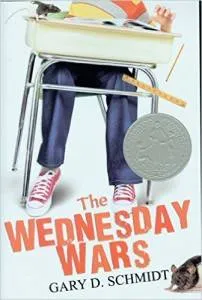 The Wednesday Wars by Gary D. Schmidt
The first line of this book reads, “Of all the kids in the seventh grade at Camillo Junior High, there was one kid that Mrs. Baker hated with heat whiter than the sun. Me.”
That does not bode well for Holling Hoodhood, the object of Mrs. Baker’s wrath, but don’t be fooled. Like any excellent teacher, Mrs. Baker catches her students off guard in the most brilliant fashion.
The Wednesday Wars by Gary D. Schmidt
The first line of this book reads, “Of all the kids in the seventh grade at Camillo Junior High, there was one kid that Mrs. Baker hated with heat whiter than the sun. Me.”
That does not bode well for Holling Hoodhood, the object of Mrs. Baker’s wrath, but don’t be fooled. Like any excellent teacher, Mrs. Baker catches her students off guard in the most brilliant fashion.
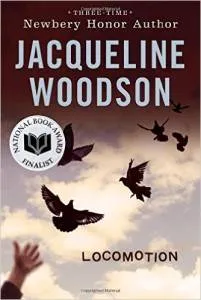 Locomotion by Jacqueline Woodson
Lonnie has had a rough life. When his parents die in a fire leaving seven-year-old Lonnie and his little sister in foster care, Lonnie takes care of his sister the best he can. When Lili gets adopted, Lonnie stays with his foster mom, critical Miss Edna. Meanwhile, at school, his teacher Ms. Marcus begins the poetry unit. “Write it down before it leaves your brain,” Ms. Marcus encourages, and despite how Lonnie feels about poetry he tries it out. The first thing we read from Lonnie is about Miss Edna: “It’s Miss Edna’s over and over/ Be quiet!” As Ms. Marcus continues the poetry journey with her class, we hear Lonnie’s voice developing and his life story coming out through his poems. “This day is already putting all kinds of words / in your head / and breaking them up into lines / and making the lines into pictures in your mind.”
Locomotion by Jacqueline Woodson
Lonnie has had a rough life. When his parents die in a fire leaving seven-year-old Lonnie and his little sister in foster care, Lonnie takes care of his sister the best he can. When Lili gets adopted, Lonnie stays with his foster mom, critical Miss Edna. Meanwhile, at school, his teacher Ms. Marcus begins the poetry unit. “Write it down before it leaves your brain,” Ms. Marcus encourages, and despite how Lonnie feels about poetry he tries it out. The first thing we read from Lonnie is about Miss Edna: “It’s Miss Edna’s over and over/ Be quiet!” As Ms. Marcus continues the poetry journey with her class, we hear Lonnie’s voice developing and his life story coming out through his poems. “This day is already putting all kinds of words / in your head / and breaking them up into lines / and making the lines into pictures in your mind.”
 Out of My Mind by Sharon Draper
Melody is eleven, brilliant, and has cerebral palsy. As a result of her medical condition, she cannot speak, move, or communicate her wishes. Often relegated to preschool level classes, her mom knows Melody is capable of so much more. When her mom enrolls Melody in a fifth grade inclusion classroom with an aide, Melody finally gets the mental stimulation she needs. Then her aide Catherine, who is studying special needs in her teacher training program, finds a way for Melody to finally communicate and even get a perfect score on a test allowing her to be on her school’s Quiz Kids team. Catherine emerges as Melody’s advocate and truly opens up a life for Melody beyond her greatest wishes.
Out of My Mind by Sharon Draper
Melody is eleven, brilliant, and has cerebral palsy. As a result of her medical condition, she cannot speak, move, or communicate her wishes. Often relegated to preschool level classes, her mom knows Melody is capable of so much more. When her mom enrolls Melody in a fifth grade inclusion classroom with an aide, Melody finally gets the mental stimulation she needs. Then her aide Catherine, who is studying special needs in her teacher training program, finds a way for Melody to finally communicate and even get a perfect score on a test allowing her to be on her school’s Quiz Kids team. Catherine emerges as Melody’s advocate and truly opens up a life for Melody beyond her greatest wishes.
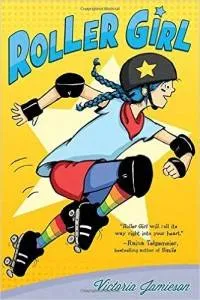 Roller Girl
For those of us who fail spectacularly at sports, twelve-year-old Astrid will warm your hearts. When Astrid decides to go out for the local roller derby team, we see her crash and burn no more than a few dozen times. But her coach, Heidi Go Seek, keeps her on the team despite Astrid’s incompetence. “If you didn’t give me one heart attack a day,” Heidi Go Seek tells Astrid, “I’d think something was wrong.” That, my friends, is true teacher commitment.
Roller Girl
For those of us who fail spectacularly at sports, twelve-year-old Astrid will warm your hearts. When Astrid decides to go out for the local roller derby team, we see her crash and burn no more than a few dozen times. But her coach, Heidi Go Seek, keeps her on the team despite Astrid’s incompetence. “If you didn’t give me one heart attack a day,” Heidi Go Seek tells Astrid, “I’d think something was wrong.” That, my friends, is true teacher commitment.
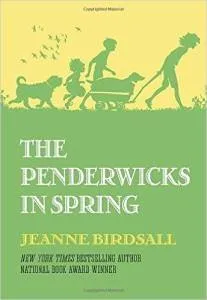 The Penderwicks in Spring (fourth in a series of four) by Jeanne Birdsall
Batty Penderwick is shy. Very shy. So when the new music teacher Mrs. Grunfield asks her to sing, Batty almost doesn’t do it. This begins the wonderful relationship between Batty and Mrs. Grunfield. Mrs. Grunfield opens Batty up to a world of expression through her voice while also helping Batty confront tough family issues.
The Penderwicks in Spring (fourth in a series of four) by Jeanne Birdsall
Batty Penderwick is shy. Very shy. So when the new music teacher Mrs. Grunfield asks her to sing, Batty almost doesn’t do it. This begins the wonderful relationship between Batty and Mrs. Grunfield. Mrs. Grunfield opens Batty up to a world of expression through her voice while also helping Batty confront tough family issues.
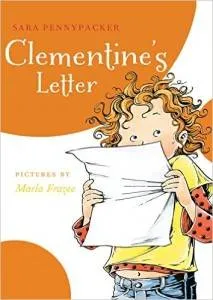 Clementine’s Letter (third book in a series of seven) by Sara Pennypacker
There is no way to not fall for Mr. D’Matz, Clementine’s second grade teacher. He is so beloved that he’s chosen as a candidate for the Adventures for Teachers committee. When his class needs to show their support by writing letters on his behalf so he can spend the rest of the school year on a research trip to Egypt, Clementine writes one so horrible so the committee doesn’t choose him. After all, what would she do without Mr. D’Matz for the rest of the school year?
Clementine’s Letter (third book in a series of seven) by Sara Pennypacker
There is no way to not fall for Mr. D’Matz, Clementine’s second grade teacher. He is so beloved that he’s chosen as a candidate for the Adventures for Teachers committee. When his class needs to show their support by writing letters on his behalf so he can spend the rest of the school year on a research trip to Egypt, Clementine writes one so horrible so the committee doesn’t choose him. After all, what would she do without Mr. D’Matz for the rest of the school year?
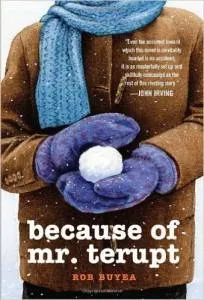 Because of Mr. Terupt (first book in a series of three) by Rob Buyea
This book, told through the voices of seven kids in Mr. Terupt’s fifth grade class, is an example of a teacher who goes beyond the academics. Not only does he encourage kids to think for themselves, he welcomes their questions and endears himself to the toughest of kids. Then an accident causes the students’ home life and personal struggles collide, bringing the kids together in a way they never realized.
Because of Mr. Terupt (first book in a series of three) by Rob Buyea
This book, told through the voices of seven kids in Mr. Terupt’s fifth grade class, is an example of a teacher who goes beyond the academics. Not only does he encourage kids to think for themselves, he welcomes their questions and endears himself to the toughest of kids. Then an accident causes the students’ home life and personal struggles collide, bringing the kids together in a way they never realized.
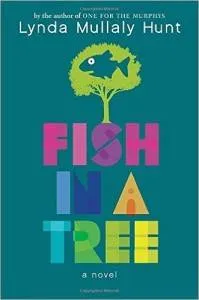 Fish in a Tree by Lynda Mullaly Hunt
Ally is so smart that she is able to hide the fact that she can’t read well into middle school. When a substitute teacher, Mr. Daniels, comes in, he sees past Ally’s disruptive distractions and is the first to figure out Ally’s secret. Mr. Daniels is the first person to discover that Ally has dyslexia, and he starts working with her after school. As the school year goes on, Ally finds herself more confident and less ashamed, opening herself up to new roles within the classroom and the school.
Fish in a Tree by Lynda Mullaly Hunt
Ally is so smart that she is able to hide the fact that she can’t read well into middle school. When a substitute teacher, Mr. Daniels, comes in, he sees past Ally’s disruptive distractions and is the first to figure out Ally’s secret. Mr. Daniels is the first person to discover that Ally has dyslexia, and he starts working with her after school. As the school year goes on, Ally finds herself more confident and less ashamed, opening herself up to new roles within the classroom and the school.
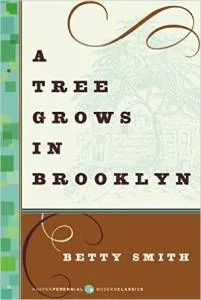 A Tree Grows in Brooklyn by Betty Smith
Sometimes a school’s personality can be changed by one person. Francie Nolan, the child of Irish immigrant parents in the early 1900s, was used to going to schools in the poorest neighborhoods in Brooklyn. But one day she changes schools where “the teachers and children here were not as brutalized as in the old school… Francie found that the different feeling in this school came mostly from the janitor.” Mr. Jenson had many roles at the school, but his largest contributing was making the kids feel treasured and safe at the school. That, I believe, is the greatest gift an educator can give.
A Tree Grows in Brooklyn by Betty Smith
Sometimes a school’s personality can be changed by one person. Francie Nolan, the child of Irish immigrant parents in the early 1900s, was used to going to schools in the poorest neighborhoods in Brooklyn. But one day she changes schools where “the teachers and children here were not as brutalized as in the old school… Francie found that the different feeling in this school came mostly from the janitor.” Mr. Jenson had many roles at the school, but his largest contributing was making the kids feel treasured and safe at the school. That, I believe, is the greatest gift an educator can give.










